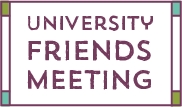The Quaker Testimony of Integrity
May 3, 2020
Scripture: Ephesians 4:1-7, 11-16
Music: Rosemary Nettrouer
Announcements:
- This week our community has suffered the sudden loss of a dear young man, David Bengi.
- Plans are in the works for a private burial with a deferred memorial service when gathering is more possible.
- David’s mother, Mary, is in the hospital at least until Monday.
- Meals are covered for the family through May 16.
- You can make donations toward funeral expenses by way of Meal Train, and a link to that is on the church website – wichitaquakers.org. Of course, you can also make donations by sending a check to the church, earmarked for these needs.
- Andrea Suttle is putting together a slide show for the family and would welcome pictures or videos you may have of David. Please send them to asuttle121@gmail.com.
- We have hired a new part-time secretary, Sandy Hartness. She’ll be working 16-20 hours per week, Tuesday through Friday. Let’s do our best to welcome her into the office.
- This morning, we plan to offer a longer time for open worship, communion after the manner of Friends, after my message. During that time, you are welcome to contribute as you feel led, by making comments on the Facebook page.
Prayer concerns:
- Mary Hiebert reports that her brother’s angioplasty went well this past week.
- Greg Newby is scheduled for a bone biopsy on his shoulder, Wednesday morning.
- Those who have suffered losses recently:
- Nellie Peters and her family
- Stan and Eloise Brown and their family
- The Bengis — Mary and Joseph, Bilhah, Rodah, and Blessing and their extended family and friends
- All of us as we deal with losses big and small in the ongoing reality of the pandemic
Prayer
God of comfort, we turn to you.
God of grace and God of glory, … Grant us wisdom, grant us courage
for the facing of this hour. (https://hymnary.org/text/god_of_grace_and_god_of_glory)
As you may know, I am in the middle of a series of messages on the Quaker testimonies.
As I have said before, these testimonies are grounded in a basic idea that faith is something we need to live out, not just talk about. And the testimonies are also grounded in a basic idea that the kingdom of God, the reign of God, is something that can be part of our world today.
A testimony, in the words of Wilmer Cooper’s A Living Faith, is an “outward expression of an inward leading of the Spirit, or an outward sign of what Friends believe to be an inward revelation of truth” (p. 101).
The testimony of simplicity calls us to recognize that things can get in our way of following Jesus. It also calls us to recognize that the things we own can be channels of love or seeds of war.
The peace testimony says, in the words of Margaret Fell, “We are a people that follow after those things that make for peace, love and unity” ((https://qfp.quaker.org.uk/chapter/19/). It calls us to seek alternatives to war. It also calls us to, in the words of James 3, “do the hard work of getting along with each other, [of] treating each other with dignity and honor” (James 3:18, The Message).
So, what does the testimony of integrity call us to?
Cooper’s A Living Faith says that the testimony of integrity
… calls for truth-telling in all our relationships. It also calls for us to be persons of honesty and authenticity in our own personhood and for a consistency between our religious faith and the way we live (p. 158).
That’s what I’m talking about this morning:
- Consistency between what we say we believe and the way we act
- Authenticity, genuineness, and truthfulness in ourselves – clearheaded self-awareness
- Authenticity, genuineness, and truthfulness in our relationships
Early Quakers lived out the testimony of integrity in at least two ways.
One way was a refusal to take oaths. You know how in a courtroom, when people are called as witnesses, the bailiff asks them to put a hand on a Bible and asks them to swear to tell “the truth, the whole truth, and nothing but the truth”? (I learned that from watching Perry Mason when I was growing up.) Well early Quakers wouldn’t do that that.
They would tell the truth. I mean, we’re talking about the testimony of integrity here. But early Quakers wouldn’t swear to tell the truth. How come?
Two reasons:
- The Bible says not to swear.
- Matthew 5:33-37
33 “… you have heard that it was said to those of ancient times, ‘You shall not swear falsely, but carry out the vows you have made to the Lord.’ [Leviticus, Numbers, Deut.] 34 But I say to you, Do not swear at all, either by heaven, for it is the throne of God, 35 or by the earth, for it is [God’s] footstool, or by Jerusalem, for it is the city of the great King. 36 And do not swear by your head, for you cannot make one hair white or black. 37 Let your word be ‘Yes, Yes’ or ‘No, No’; anything more than this comes from the evil one.[n]
- James 5 echoes that.
- Reason #2 — As someone else put it, “If one’s actions are consistent with one’s words there will be no need for an oath” (New Oxford Annotated Bible, p. 2124n).
Just speak simply and truthfully, and there’s no need for swearing, on your mother’s grave or on the Bible or on anything else.
Another way early Quakers lived out the testimony of integrity was in their business dealings. Here’s Cooper on that:
Believing that the price set should not exceed the value and that they should then stick to the price rather than bargain, Quakers became known for their single price system (Living Faith, p. 105).
If you’re selling a good or service, ask a fair price and stick to it.
Related to this aspect of the testimony of integrity is this set of queries from Britain Yearly Meeting’s Quaker Faith and Practice:
Are you honest and truthful in word and deed? Do you maintain strict integrity in your business transactions and in your relations with individuals and organisations? Are you personally scrupulous and responsible in the use of money entrusted to you, and are you careful not to defraud the public revenue? (20.43, https://qfp.quaker.org.uk/chapter/20/)
So the testimony of integrity calls us to speak truthfully and to be responsible in our business transactions.
The testimony of integrity also calls us to personal authenticity, what we might call self-awareness.
Sometime this past week, I came across a blog post by a psychologist, Dr. Tracy Hutchinson, called, “10 Things Mentally Strong People Do During a Pandemic” (https://www.psychologytoday.com/us/blog/the-pulse-mental-health/202004/10-things-mentally-strong-people-do-during-pandemic?utm_source=FacebookPost&utm_medium=FBPost&utm_campaign=FBPost&fbclid=IwAR2JdpNfYDvBQ5rzZfX1TWZnXYpQsYC8xybRIWXxlfB2HjFNndomHBGFnn8)
As I read the blog, I was struck by how much these ten things relate to the testimony of integrity, and also how much they seem wise when dealing with any trauma. See what you think.
Here’s what Dr. Hutchinson had to say:
The COVID-19 global pandemic and the systemic ramifications are not only unprecedented but harrowing. We are all adjusting to new realities and grieving the loss of old ones. All of us are simply trying to manage our daily lives taking care of our children or parents, dealing with financial stresses, and adjusting to a new way to live. ***
Amen to that, right?
Most of us know the basics: It is vital to create daily habits, to exercise, and to connect with our social supports using virtual meetings and social media. However, here are some suggestions based on evidence of how mentally strong people respond to crises. …
1. They limit news and media exposure. *** Mentally strong people limit their news exposure, choose reliable and responsible print/media, and limit exposure to distressful images shown on the news.
2. They accept their feelings as normal. … A resilient individual understands that feelings such as fear, anxiety, hopelessness, anger, and sadness are normal because the information is too overwhelming to process at once. …
3. They carefully choose the leaders they follow. Mentally strong people follow those who display healthy leadership skills and mental health. … It is both confusing and psychologically harmful to watch leaders who publicly argue and misstate the facts and the research. ***
4. They limit social media and exposure. Mentally strong people understand how social media operates and limit their exposure. ***
5. They display self-compassion for lack of productivity. There may be self or societal pressure to “be productive” with the increased time you may have at home. The question to ask yourself is, “Is it reasonable to be productive when we are at war?” It is important to understand that lack of focus, concentration, and overwhelming feelings are common during this time. …
Mentally strong people realize that when their physiological and safety needs feel threatened—such as during a pandemic—they don’t put pressure on themselves to produce or achieve.
6. They focus on facts. Mentally strong individuals are acutely aware of when their emotions are “getting the best of them.” ***
7. They meditate. The benefits of meditation include anxiety reduction, reduced stress, increased attention span, decreased depression, and improved emotional health and well being. …
8. They limit toxic people. Mentally strong people understand toxic people and behaviors and limit their time with them. Behaviors such as gossip, chronic lying, being demanding, being self-centered on their needs vs. yours, are quite negative and take a toll on your well being. While you may be able to tolerate some toxicity with friends, family, and colleagues during non-pandemic times, eliminating toxic energy is vital when you are in survival mode….
9. They focus on self-care. Mentally strong people consistently use self-care and attempt to be flexible with new routines. As many gyms are closed, they may choose other exercise options while remaining socially distanced, such as running, walking, biking, and doing yoga. They prioritize things that will help them through the pandemic such as raising their vibration with laughter and connecting with their family and friends, coupled with rest and good sleep hygiene.
10. They know their personality needs: introvert vs. extrovert. Mentally strong people know themselves and what they need to feel supported. Those that are introverted focus on internal states of being and small gatherings versus external sources of stimulation (a lot of socializing). … Conversely, extroverts gain energy from other people and enjoy many social activities. Introverts realize they may have a need to connect virtually, using Facetime, Zoom, Skype, and Google hangouts, but may do so in small groups and less often than extroverts. Both personalities may have different needs to promote well being.
Consistent with the testimony of integrity and its call for “honesty and authenticity in our own personhood,” mentally strong people are aware of who they are and what they need. They face reality about the world and about themselves, and they take care of themselves as best as they can without expecting more than is reasonably possible.
Yes, I’m talking to you. Yes, I’m talking to myself too. Catherine.
Just as the testimony of integrity calls us to be honest in what we say and in our business lives, so it calls us to be honest with ourselves.
The testimony of integrity also calls us to truth-telling in our relationships. I’m not sure that means we have to be “brutally honest.” It does urge us toward being lovingly honest.
Ephesians 4 speaks to that. Beginning in verse 1, the author writes,
4 I … beg you to lead a life worthy of the calling to which you have been called, 2 with all humility and gentleness, with patience, bearing with one another in love, 3 making every effort to maintain the unity of the Spirit in the bond of peace. 4 There is one body and one Spirit, just as you were called to the one hope of your calling, 5 one Lord, one faith, one baptism, 6 one God and [Maker] of all, who is above all and through all and in all.
7 But each of us was given grace according to the measure of Christ’s gift. …
11 The gifts he gave were that some would be apostles, some prophets, some evangelists, some pastors and teachers, 12 to equip the saints for the work of ministry, for building up the body of Christ, 13 until all of us come to the unity of the faith and of the knowledge of the Son of God, to maturity, to the measure of the full stature of Christ. 14 We must no longer be children, tossed to and fro and blown about by every wind of doctrine, by people’s trickery, by their craftiness in deceitful scheming. 15 But speaking the truth in love, we must grow up in every way into him who is the head, into Christ, 16 from whom the whole body, joined and knit together by every ligament with which it is equipped, as each part is working properly, promotes the body’s growth in building itself up in love. ***
25 So then, putting away falsehood, let all of us speak the truth to our neighbors, for we are members of one another.
Gently, with great compassion, we must speak truth to one another. We must. In order to be the people God is calling us to be, we must speak truth to one another. Gently, yes. With great compassion, yes. With humility, yes. But still the truth.
Otherwise, we are simply not dealing with reality. If we’re not facing reality in our relationships, we’re living in a make-believe world in which everything is just fine.
You know what “fine” means, right? I’m not going to say what the F stands for from the pulpit, but FINE stands for screwed up, insecure, neurotic, and emotional.
How are you doing? I’m fine. 😊
Another thing – when we don’t deal truthfully with one another, it shows a lack of respect. It says, in effect, “You can’t handle the truth.” I’m hearing Jack Nicholson in “A Few Good Men”: you can’t handle the truth.
I’m also thinking of one of Immanuel Kant’s principles. Yes, I know it’s weird to talk about Jack Nicholson and Immanuel Kant back-to-back. But hear me out.
Kant was a German philosopher in the 1700s. He was methodical, and his writings are not for the faint of heart. But he had some interesting things to say.
Kant is famous for his categorical imperatives. I’m not going to try to explain what a categorical imperative is. You’re welcome. But here’s one:
Act in such a way that you treat humanity, whether in your own person or in the person of any other, never merely as a means to an end, but always at the same time as an end. (https://en.wikipedia.org/wiki/Categorical_imperative, emphasis added)
What that boils down to is always treat people, yourself and others, with respect.
Act in such a way that you treat humanity, whether in your own person or in the person of any other, never merely as a means to an end, but always at the same time as an end.
Respect.
And I will say with some conviction that if we’re not speaking truthfully and authentically with one another, we are not treating each other with respect.
- We’re not dealing with reality in our relationship.
- We’re acting as if others can’t handle the truth.
- We’re taking away the opportunity to grow.
Sometimes I can get a little preachy. That’s the truth.
And this is important. If we’re not speaking truthfully and authentically with one another, we are not treating each other with respect.
Back to Ephesians 4:
14 We must no longer be children, tossed to and fro and blown about by every wind of doctrine, by people’s trickery, by their craftiness in deceitful scheming. 15 But speaking the truth in love, we must grow up….
The testimony of integrity “… calls for truth-telling in all our relationships. It also calls for us to be persons of honesty and authenticity in our own personhood and for a consistency between our religious faith and the way we live.”
Now please join me in a time of quiet waiting. You are welcome to contribute as you feel led, by making comments on the Facebook page. I will close.
May we live into the testimony of integrity. May we find ways to live out our faith consistently. May we be honest with ourselves and others. May our relationships be characterized by openness and authenticity.
We are meeting in person and also streaming our sermons on Facebook at 10:00 AM CST. Watch live:
https://www.facebook.com/universityfriendschurch/
Not on Facebook? You can see all of our posts and videos on our site here!



